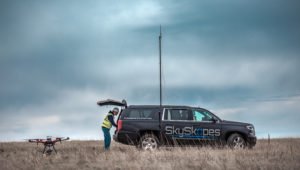
As industries across the globe come to grips with the “new normal” of a COVID-19 challenges, drone service providers (DSP) are launching new levels of innovation across a range of public and commercial sectors.
Last year, Barclays projected drones will lower costs by $100 billion across a majority of industries. The FAA paints a rosy picture of clear skies for drone growth, reporting the UAS industry is “at an inflection point of demonstrating powerful stages of growth” that will “continue to accelerate over the next few years.”
Amid the pandemic crisis, DSP’s are increasingly being classified as “Essential Service Personnel,” delivering critical, contactless solutions across a diversity of use cases – healthcare, COVID research, energy, transportation, oil-and-gas, surveying and construction.
In addition, essential DSP’s continue to help save lives on a regular basis, providing vital reconnaissance, mapping and imagery for police, fire and search-and-rescue agencies – especially during the COVID crisis. For example, the World Economic Forum recently reported government agencies in China used drones to deliver medical equipment between hospitals and testing centers.
“The economic and public disruption of the pandemic forced everyone – the public and private sector to rethink how we do things,” Matt Dunlevy, CEO of drone services provider SkySkopes, said. “Agencies and corporate clients have begun to understand how powerful UAS technology can become as a positive agent of actionable change in a COVID world.”
Drone service providers such as SkySkopes are revolutionizing the new role of UAS tech as an essential service in a pandemic world. Headquartered in North Dakota, the company primarily deploys drones to produce actionable intelligence for utilities and oil companies by using sensors such as LiDAR, Optical Gas Imaging and EO.
Since the outbreak of COVID earlier this year, SkySkopes has been certified as “Essential Service Personnel” in states across the U.S. that have been pummeled by the pandemic.
Utilities
As industries – such as utilities — seek unmanned solutions to address contagion concerns among workers, SkySkopes has evolved into a leader in the field, becoming the first drone service provider to string power lines in the U.S.
“This is most frequently a project completed by people physically climbing the towers, exposing themselves to dangerous heights or with helicopters manned by pilots and with serious costs incurred,” Dunlevy said in a recent interview.
Essential, utility-facing, drone missions can curtail costly, dangerous utility blackouts. As more public-safety agencies deploy drones for rescue and disaster scenarios, keeping power supplies sustainable has never been more important.
In addition, oil-and-gas companies turn to SkySkopes to inspect pipelines and other critical infrastructure with next-level sensor payloads. For example, SkySkopes uses a state-of-the-art LiDAR system, providing centimeter-level accuracy for clients’ surveying needs. In addition, a powerful 24 MP camera is integrated with the LiDAR unit to fuel a robust, simultaneous capture of still imagery, which in turn, makes asset identification easier.
“We’re able to weather the storm of the pandemic because utilities see the need to use drones to prevent the worst from happening,” Dunlevy said.
Public Safety
As public-safety agencies face added pressure to address COVID-related missions, drone service providers like SkySkopes are making their job easier.
In April (in the thick of the COVID lockdown), SkySkopes worked with police and fire departments in Minot, N.D. to help successfully locate a missing child with a UAS. In addition to following all FAA regulations, the SkySkopes team faced the challenge of ensuring all drones and related equipment had been properly prepped, conforming to COVID-19 safety standards.
“It was great to put some of the lessons learned from past training into practice in the real world,” Dunlevy said. “We have done mock emergency response scenarios and actual emergency response scenarios all over the country. This is one of the things we like to be known for. This is also why we are certified as ‘Essential Service Personnel’ in states hit even harder by the coronavirus.”
Looking Forward
As the COVID-19 continues to evolve and force commerce and government to face “new-normal” obstacles, the worldwide network of professional drone service providers will continue to innovate contactless, remote and essential solutions to the global community. Services will continue to expand to meet new challenges — aerial disinfection of public facilities, social distancing communications and essential services support.
“No one knows the scope or duration of the pandemic. But our society has always come together to create safe, effective and ethical strategies to address challenges like COVID-19,” Dunlevy said. “Drone companies such as SkySkopes want to build on those values by strengthening the ties that bind us together during adversity.”
“As heroic workers make a difference on the ground, we’ll take to the air. We’ll support emergency missions and we’ll increase the reliability and efficiency of the national energy grid by utilizing unmanned aircraft. We’re not going anywhere.”
Jason is a longstanding contributor to DroneLife with an avid interest in all things tech. He focuses on anti-drone technologies and the public safety sector; police, fire, and search and rescue.
Beginning his career as a journalist in 1996, Jason has since written and edited thousands of engaging news articles, blog posts, press releases and online content.
Email Jason
TWITTER:@JasonPReagan
Subscribe to DroneLife here.







[…] adoption has been met with sluggish regulatory change. Usually, and particularly within the case of COVID-19, regulators are left enjoying catch-up as corporations seize new UAS […]